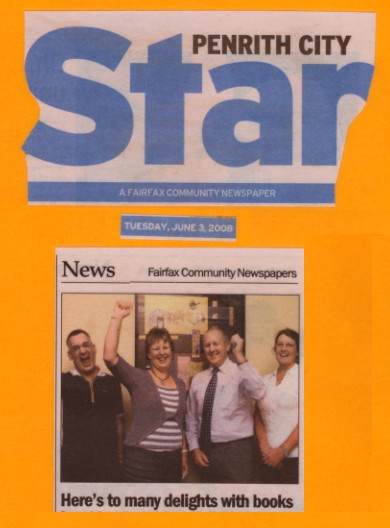Our school came out of the prize barrel: the results of last year’s book review program, which I conducted out of the school library!
Monthly Archives: June 2008
Out of the mouths of babes
Yesterday, a group of Stage 3 (Year 6) students met with me in three small groups, in the school library, to compile a Rap Response to the first Rap Point in the Identity Rap. We read some articles by some local Aboriginal educators and then the students had to discuss when they had returned to the house they’d lived in when they were younger, and to recall some well-worn phrases from parents and grandparents that continue to shape their identities, and that have become “messages for a good life”.
I can highly recommend Circle Time as a successful strategy for scribing the students’ fresh, unassuming responses to the stimulus material. They were delivering their grandparents’ sayings with such seriousness. (I was inwardly in hysterics by the spontaneity and honesty of their oral replies, and it was all I could do to hold the pencil steady as I scribed their warmly humorous answers.)
They said:
We will always remember these wise words:
“When cooking pikelets, don’t get too close to the pan.”
“Don’t jump on the couch.”
“Chew like a lady.”
“Never draw on people when they are asleep.”
“These things you should remember because I did it the hard way.”
“Always start the day with a good breakfast.”
“Study hard!”
“Never pick your nose in public.”
“Respect people, even if you dislike them.”
Wonderful stuff, eh?
I have an article about Circle Time in a recent issue of Scan. If you’re interested in following it up, the details are:
‘Circle time: maximising opportunities for talking and listening at Penrith Public School’in Scan 26(4) November 2007, pp 4-7.
Identity: Sharing Our Stories rap
The NSW DET rap, Identity: Sharing Our Stories for Stages 3 and 4 is underway, the second such rap to be presented in a blog format (hosted by the School Libraries and Information Literacy Unit via Edublogs) rather than the traditional email and listserv arrangement.
It’s not too late to sign up a class group. Even if your school is not planning to participate, I would like to urge teacher librarians to drop by the rap and have a look at what I believe is going to be a great learning experience – for students, teachers, teacher librarians, AEOs (Aboriginal Education Officers) and community members. A range of excellent resources is available, including: programming and planning, proformas, music, and online factual texts with Aboriginal and Torres Strait Islander People sharing their personal stories about what has formed their identities and has made them strong. Several of the participating schools have already posted their introductory, jointly-constructed, blog entries (see the section called “Intro”).
Many teachers complain they find it difficult to make sure they properly address Aboriginal perspectives in their programs, and to find relevant resources. The rap is also a great way to develop a familiarity with blogging as an educational tool. How I wish I had my interactive whiteboard already; at my school we are making do with a regular computer, and the students are highly motivated to rap together, and to read the posts from other schools.
Last term’s completed Wilfrid Gordon McDonald Partridge book rap, also in blog format, is still available for comparison purposes. The “Teacher” section contains many “Frequently Asked Questions” about blogging. Also worth a look!

